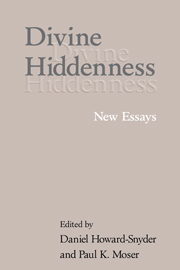Book contents
- Frontmatter
- Contents
- List of Contributors
- Introduction: The Hiddenness of God
- 1 What Is the Problem of the Hiddenness of God?
- 2 What the Hiddenness of God Reveals: A Collaborative Discussion
- 3 Deus Absconditus
- 4 St. John of the Cross and the Necessity of Divine Hiddenness
- 5 Jonathan Edwards and the Hiddenness of God
- 6 Cognitive Idolatry and Divine Hiding
- 7 Divine Hiddenness: What Is the Problem?
- 8 A Kierkegaardian View of Divine Hiddenness
- 9 The Hiddenness of God: A Puzzle or a Real Problem?
- 10 Seeking But Not Believing: Confessions of a Practicing Agnostic
- 11 The Silence of the God Who Speaks
- Bibliography
- Index of Names
- Index of Subjects
4 - St. John of the Cross and the Necessity of Divine Hiddenness
Published online by Cambridge University Press: 10 November 2009
- Frontmatter
- Contents
- List of Contributors
- Introduction: The Hiddenness of God
- 1 What Is the Problem of the Hiddenness of God?
- 2 What the Hiddenness of God Reveals: A Collaborative Discussion
- 3 Deus Absconditus
- 4 St. John of the Cross and the Necessity of Divine Hiddenness
- 5 Jonathan Edwards and the Hiddenness of God
- 6 Cognitive Idolatry and Divine Hiding
- 7 Divine Hiddenness: What Is the Problem?
- 8 A Kierkegaardian View of Divine Hiddenness
- 9 The Hiddenness of God: A Puzzle or a Real Problem?
- 10 Seeking But Not Believing: Confessions of a Practicing Agnostic
- 11 The Silence of the God Who Speaks
- Bibliography
- Index of Names
- Index of Subjects
Summary
It hasn't escaped the notice of Christian believers that not everyone is a Christian; indeed, not everyone is a theist. This is a cause for alarm for some theists, but only for those who hold the further claim that: (G1) God desires everyone to believe in His existence. If God is omnipotent and omniscient, presumably He could bring it about that every person (or every person capable of understanding and assenting to theism) believes in God. It might be difficult to defend (G1) on purely philosophical grounds, so theism narrowly considered might plausibly escape from the apparent tension here. Christians and some other theists do seem committed to (G1), however, opening the door to a simple refutation of their position by means of the following modus tollens argument: If God exists, then nothing contrary to His (ultimate) desires could exist in the world. Something contrary to God's ultimate desires (nonbelief in the gospel message) does exist. Therefore, God does not exist. If nonbelief is not just contrary to God's desires but also evil (or if being contrary to God's ultimate desires entails being evil), then the problem of nonbelief will be an instance of the problem of evil. But it can be considered as a problem in its own right, prescinding from whether or not nonbelief is a species of evil (and what kind of evil it is).
General Assessment of the Argument From Involuntary Nonbelief
Theodore Drange proposes that some version of this argument successfully refutes Christianity, at least any species of Christianity committed to (G1).
- Type
- Chapter
- Information
- Divine HiddennessNew Essays, pp. 83 - 97Publisher: Cambridge University PressPrint publication year: 2001
- 1
- Cited by



